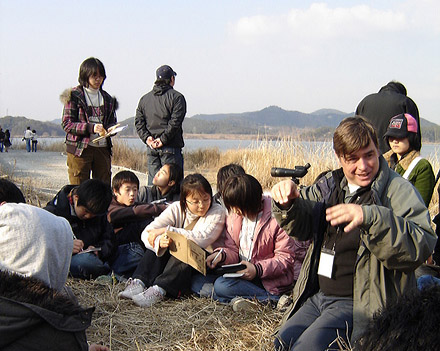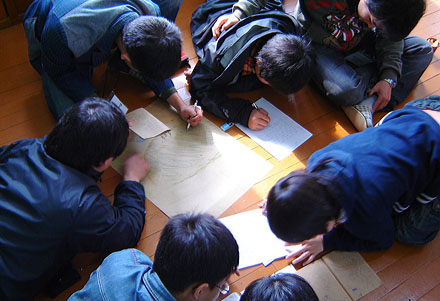My name is Geoff Styles. I'm a teacher at Wonkwang Language Center in Iksan, Jeonbuk, and an active ex-pat member of Birds Korea. My wife Emily and I just finished volunteering at a two-day educational English Camp held at Upo Wetland, working with 27 middle school students who signed up for the camp from across south-eastern Korea. The camp was set up by the Nakdong River office of the Ministry of Environment (MOE), as one of a broad range of conservation-driven activities within the MOE-UNDP-GEF wetlands biodiversity project.

The aim was simple - to raise awareness about conservation, ecology, birdwatching and internationally important birds and wetlands – but with a unique approach for Korea, to do so in an international language, English. For a native English speaking birdwatcher living in Korea, it was an extremely rewarding experience, and a great way not only help educate young people in a new way, but also to support local groups and organizations in their preparations for the Ramsar Convention, which will be held in nearby Changwon City in the fall, 2008.
The English Camp was a wonderful way for us to give something back to Korea, and provided a great way for us to meet a wide range of people interested in conservation and birding. The camp was set up by the Nakdong River office (most especially Ms Hong Su-Yeon), and led by Mr. Nial Moores, the Birds Korea Director, and made possible by a wonderful group of volunteers – some from Birds Korea, some working for the Upo Wetlands Centre, some for Changnyeong or Masan-Changwon KFEM and some who answered a call for volunteers from the Nakdong River office.
As this was the first English camp of its type, we created most of the activities and teaching materials from scratch (too see some of these please go to http://www.birdskorea.or.kr/index.html, and click on the Great Tit icon in the sidebar) and were able to set out the guidelines and see to it that they were adhered to. The students' feedback confirmed their new appreciation of animal-habitat relationships, as well as growing awareness of environmental problems such as noise, pollution, reclamation, and disturbance.
It was very interesting for us to see how their perspectives on these issues changed over the two days, and it was moving to hear their positive thoughts at the completion of the camp. As a teacher it was inspiring to have the wetland as your classroom and birds, trees and cars as the course materials. The students also expressed how much fun they had and many of them asked us if there was going to be another camp like it. We would certainly love to do another camp like it in the future!

This camp, however, would not have been possible without an organization like Birds Korea, which provides opportunities for foreigners and Korean nationals alike to get deeply involved in bird conservation in South Korea.
Birds Korea is unique as it has both Korean and foreign members and Korean and English-language websites, creating the link between the two languages and cultures, as was evident in this camp: five English language volunteers and nine Korean language volunteers working together to achieve the same goal.
Having been involved in this camp and a few other activities in the past year, it is evident that the 2008 Ramsar Convention conference is not yet a highly publicized event. That, along with the recent closure of the Saemangeum sea wall, and the now proposed reclamation of Korea's most important tidal flat remaining - the Geum - pushes the need for environmental education to the fore. It is through national-international volunteer activities like the Upo English Camp that this information can be shared and understood, leading over time to better decisions on environmentally-related development.
With the second spring of the Saemangeum Shorebird Monitoring Program (SSMP) upcoming, and camps like this one up and running successfully, there are now lots of ways for foreigners to get involved in the next few months. Migration also starts soon, so we'll be organizing another Birds Korea 'Day Out', taking foreigners and Koreans from our community in the Iksan area out to see some great birds. Last November we took a group of 8 up to Seosan to see the Baikal Teal, with all 8, as well as many who didn't come that time, expressing interest in heading out again and learning more. If you want to get involved in any way, now's the time to do it!
To find out more, please read and join the Birds Korea forum (its free!) or consider signing up as a Birds Korea member, to give your support and to receive monthly emailings.
Geoff Styles, Iksan, March 5, 2007



